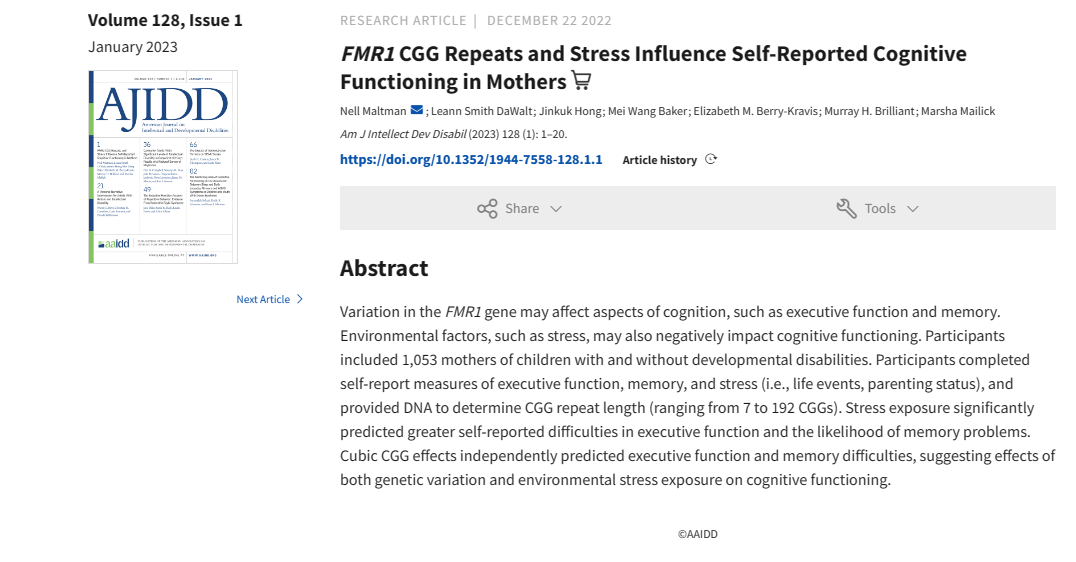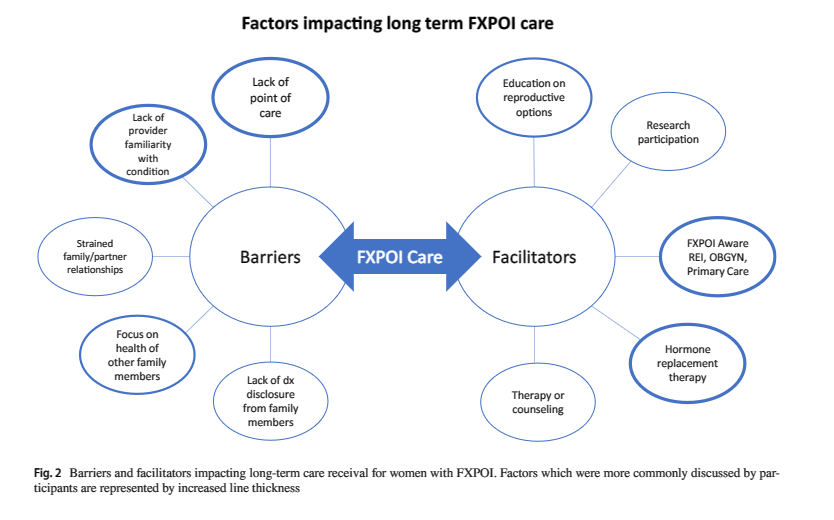Summarized by Nell Maltman
Summary (background, methods, results):
FMR1 CGG repeat variability may affect aspects of cognition, such as executive functioning and memory. Executive functioning allows us to plan activities, make decisions, and stay focused. Stress may also negatively impact cognition. Most studies exploring associations between the FMR1 gene, stress, and cognition have focused on people who have the Fragile X premutation (55-200 CGG repeats) or full mutation Fragile X (>200 CGG repeats). However, there is less known about how the FMR1 gene, in addition to stress, impacts cognition across the range of FMR1 CGG repeats below the full mutation (or under 200 CGG repeats). The goal of this study was to examine links between FMR1 CGG repeats, stress, and cognition among mothers.
Participants included 1,053 mothers of children with and without developmental disabilities. Most mothers were recruited from a population-based biobank, supplemented with cases of mothers from Fragile X clinics. Participants completed self-report measures of executive functioning, memory, and stress. One aspect of stress was measured by the total number of life events from the past year. Both positive events (such as marriage) and negative events (such as the death of a family member) have been shown to be stressful to one degree or another. Another aspect of stress was whether mothers had a child with a developmental disability. The developmental disabilities reflected in the study included Fragile X syndrome, autism, attention-deficit/ hyperactivity disorder, and learning disabilities, among others. All mothers provided DNA to determine their CGG repeat length (ranging from 7 to 192 CGG repeats).
Higher levels of stress, in addition to the specific length of CGG repeats, were associated with more difficulties in executive functioning and memory. Mothers who had CGG repeats between 7-25 and ~80-110 had more difficulties with executive functioning. Mothers with CGG repeats over 110 had fewer difficulties with executive functioning. Mothers with CGG repeats between 7-25 and 100-130 had the highest likelihood of having memory problems. In addition to CGG repeats, age and education were also associated with executive function and memory.
Why this matters:
The findings from this study showed associations between the FMR1 gene and stress on cognition. Life events, as well as parenting a child with a developmental disability, can affect cognition, though not to the extent of clinical impairment. Additionally, mothers of children with developmental disabilities had more life events during the past year, which suggests more stressors for these individuals. It is critical that clinicians who work with families of children with developmental disabilities, including Fragile X syndrome, consider stress when evaluating supports that are needed for families.
Next steps:
Research is needed that includes more racially and ethnically diverse participants. This study relied on self-report questionnaires to measure cognition, but other types of measures could also be useful. There are other ways to measure FMR1 that could help us understand how the gene impacts cognition. Finally, it will be important for research to evaluate these relationships in men.
Acknowledgements/funding:
Research reported in this publication was supported by the Eunice Kennedy Shriver National Institute of Child Health & Human Development of the National Institutes of Health under Award Numbers R01 HD082110 (PI: MM), T32 HD007489, and U54 HD090256 and the Waisman Center at the University of Wisconsin-Madison. We would like to acknowledge all of the families who participated in this study. We would also like to acknowledge Renee Makuch, Jan Greenberg and Terrie Kitchner for their contributions to this study.
about

Hilary Rosselot
Hilary joined the NFXF team in 2019. Prior to joining the NFXF team, she worked at the Cincinnati Fragile X Research and Treatment Center for over five years. She has experience as a clinical research coordinator across many types of clinical trials and served as the clinical research manager for the Cincinnati program. She earned a bachelor’s degree in psychology, a master’s, and is a SOCRA certified clinical research professional (CCRP). She enjoys time with family and friends, a great book, a strong cup of coffee and, of course, a good laugh!
FOR MORE DETAILS VISIT:
Read the abstract for the FMR1 CGG Repeats and Stress Influence Self-Reported Cognitive Functioning in Mothers publication in the American Journal on Intellectual and Developmental Disabilities.
MORE RESEARCH RESULTS
FMR1 CGG Repeats and Stress Influence Self-Reported Cognitive Functioning in Mothers
Researchers at the University of Wisconsin looked at the relationship and influence of FMR1 CGG repeats and stress on self-reported cognitive functioning in mothers.
The diagnostic experience of women with fragile X–associated primary ovarian insufficiency (FXPOI)
Researchers at Emory University conducted qualitative interviews with 24 women with FXPOI exploring how FMR1 screening, physician education, and supportive care impacted their experience receiving a diagnosis. Their results are in!



